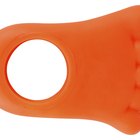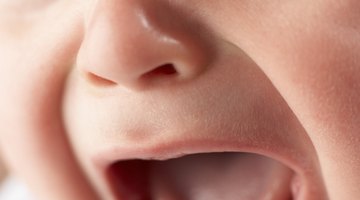Teething Symptoms for Infants: Not Eating
An infant experiences many symptoms during teething.
If your infant shows signs of significant gum tenderness or pain during tooth eruption, she may not feel like eating. Helping to reduce her pain, by giving her acetaminophen or ibuprofen, for example, may make her feel well enough to resume eating. Contact your pediatrician with your concerns about your baby not eating.
Teething Basics
By the time your infant is 6 or 7 months old, you have probably established a feeding schedule. It is worrisome if your infant suddenly stops eating, though this is what can happen when a new tooth is erupting, causing gum pain. A child gets a total of 20 primary teeth, also called baby teeth. Teething often follows a hereditary pattern, though the first tooth usually erupts by 6 or 7 months. A child usually has all his primary teeth by the time he is 3 years old.
Symptoms

Can Teething Cause Loss of Appetite?
Learn More
Each infant experiences teething differently, and there are a great variety of symptoms. Generally, teething causes drooling, bulging gums, fussiness and irritability, night waking and biting on toys, fingers or your breasts. When a tooth erupts through the gums, it causes varying amounts of pain. Your infant may not want to eat because his mouth hurts.
In addition, some infants experience diarrhea during teething because of the extra saliva that is swallowed. If your baby has diarrhea, his stomach may be uncomfortable, reducing his appetite.
Time Frame
Teething symptoms start four days before the tooth eruption, occur on the day of the eruption and continue for three days after the eruption, according to a study published in "Pediatrics."
Your infant may not want to eat at some point during this period but shouldn't skip every meal.
Make sure she is getting enough fluids even if she is not eating to prevent dehydration. If you are concerned about her eating habits, call your pediatrician.
Remedies

Do Babies Cry Inconsolably When Teething?
Learn More
An infant who is teething is probably not eating because his mouth hurts. Giving him acetaminophen or ibuprofen can safely reduce his pain and help him to eat. Between meals, try a frozen teething ring or a frozen washcloth for him to chew on to soothe his gums. Beware of using teething gels, because they numb the gums temporarily but they also taste terrible and can numb the lips and tongue. Your infant may swallow too much, according to the AskDrSears website. Overusing teething gels may also interfere with your infant's appetite.











